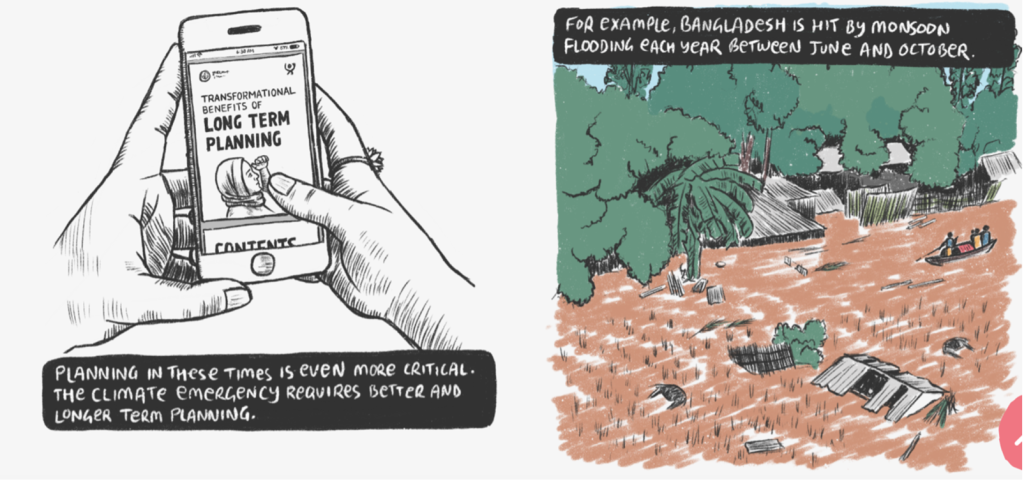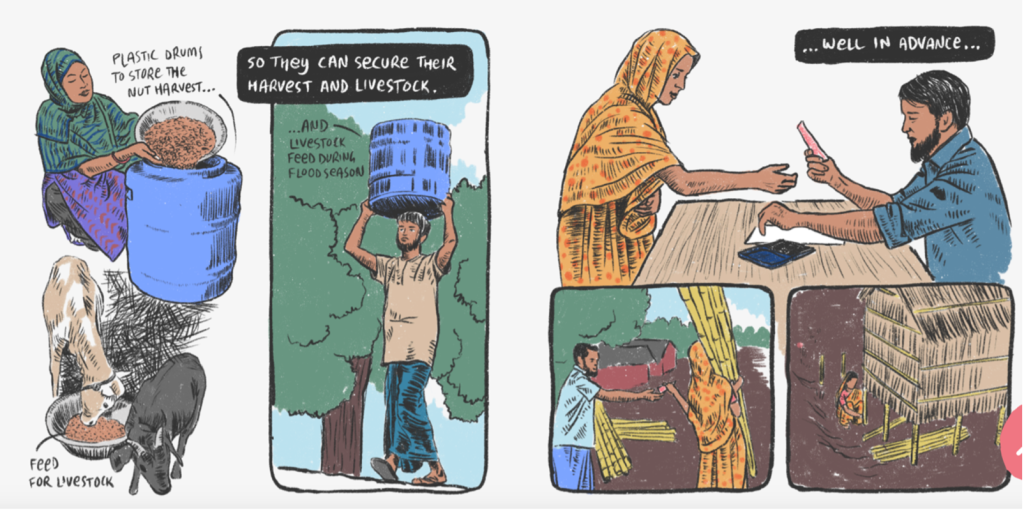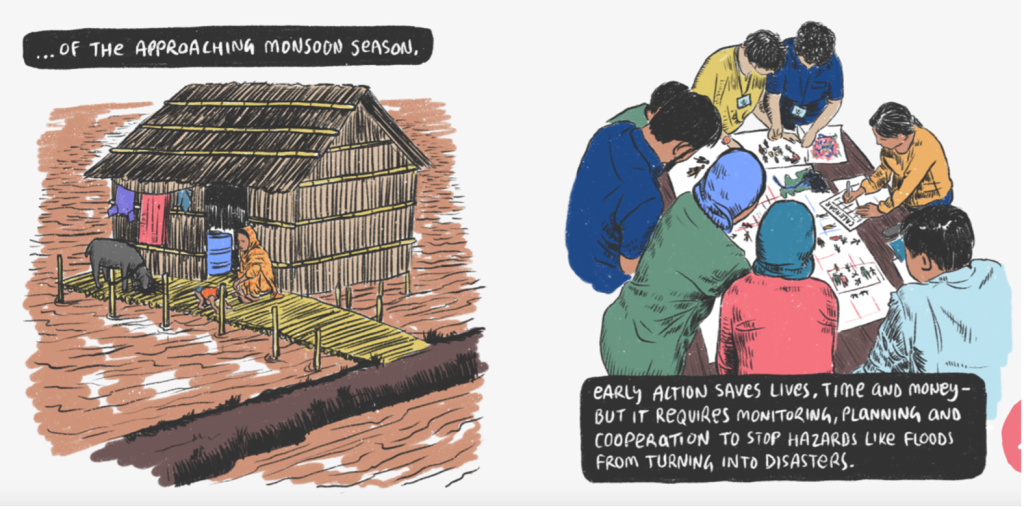Extension Activities Units 5 & 6
Units 5 & 6 – Opportunity
- SDG 5 – Gender Equality
- SDG 10 – Reduced inequality
After every two Units you are offered a choice of extension tasks. Depending on what area you most want to develop, choose and complete a relevant task. You are welcome to complete as many as you like.
These are not tests, and no marks are awarded. They are opportunities to develop your language further, based on a self-assessment of your needs.
NOTE: It may be that in your local context you are not able to access the videos on YouTube. They’re included here alongside other free-to-access resources, so hopefully you will still have plenty of choice.
Develop your knowledge of the SDGs
- Go Goals is a ready-to-use board game developed by the United Nations that helps you understand the Sustainable Development Goals, and how each of us can contribute to realising the goals. Access this link to the game and click on the white circle next to goal 5 and goal 10 and answer the set of quiz questions that appear. Check your answers when you are done.
- Follow ‘Noa’s Journey to Power’ to consolidate your understanding of why gender equality is a key priority of the United Nations’ work. Do the interactive tasks to learn about education for girls.
- Watch the interactive video (1 min). As you watch, follow the instructions on the screen and when the video pauses click this symbol
 and complete the tasks that appear.
and complete the tasks that appear.
Develop your writing
In Unit 6 you learned about SDG10 Reduced Inequality and the way inequalities can restrict the life opportunities for some. You’ve learned about wealth inequality and inequalities related to gender and to race. Climate inequality is another way that people’s lives are affected by their circumstances. Read the graphic story and see how flooding regularly affects the lives of people in Bangladesh.
Write a paragraph about ways to support these communities to help them plan for the floods and develop more resilient infrastructures.




2. Write an essay about women in science
British Council LearnEnglish – Learn how to write an essay that suggests reasons for and solutions to a problem.
Develop your speaking
Record a 60-second video of yourself explaining what you have learned about SDG5 or SDG10.
Record your presentation here:
Develop your pronunciation – Word stress
In Unit 5 you practiced putting the word stress in the right place for the various members of a word family. You can do further practice here with these online tasks from Cambridge Assessment at C1/C2 level, or these tasks at B1/B2 level. Add new word families to your vocabulary book.
Develop your vocabulary
Add the new vocabulary you learn to your vocabulary note-book.
Word families
In Unit 5 you looked at word families. To develop your knowledge further you can use the Word Family Framework. Make a list of some new vocabulary you have learned this week. Do you know all of the members of the word family? Go to the site and choose language level C1. Check each of your words to see members of the word family (you can scroll down the alphabetical list or jump to the first letter of the word at the top of the page). Note all of the associated words in your vocabulary book.
Language in the news
Resources from BBC Learning English
Access the link and listen to one (or more) of the Language in The News stories to learn or consolidate some vocabulary (to see the transcript, when you are in YouTube click the 3 dots in the bottom right under the video and select ‘show transcript’).
- California – law says women must be on boards
- Climate change report: rich must pay for poor
- Kamala Harris makes history
Mind map
Create a mind map using bubbl.us
Use this free tool to create a mind map of some of the new vocabulary you have learned relating to types of inequality. Include compound nouns and word families, if appropriate. You don’t need to create an account – just click the green ‘start now’ button (open the link in Chrome, Firefox or Safari – NOT Internet Explorer). When your mind map is complete, click the ‘save as’ icon in the top right-hand corner of the screen. Choose the ‘save as jpg image’ and once downloaded make a copy to your own computer.
Develop your reading
Read for interest
Access one (or more) of the links and read the text. Practice your skim reading first to get a general idea of what the text is about, and then read in more detail, focusing on the parts that interest you.
Articles from The Conversation:
- How gender inequality is hindering Japan’s economic growth
- Online abuse could drive women out of political life: the time to act is now
- None of the 2021 science Nobel laureates are women – here’s why men still dominate STEM award winning
- Women’s participation is essential to achieve global climate targets
- Teachers less likely to take phones away from white, privileged children, by a University of Sussex lecturer
- How young children can develop racial biases – and what that means
- What the racial equality movement can learn from the global fight for women’s rights.
- What is systemic racism and institutional racism?
Scan for specific information
BBC Learning English – Millionaires and billionaires. Read the short text from Cambridge Assessment about wealthy people and do the online tasks.
Develop your listening
Access one (or more) of the links and listen to the text. Listen once for general idea and then listen again for detail, focussing on the parts that interest you.
- A Girl like Me is a 2005 video documentary by Kiri Davis (7 mins) which examines such things as the importance of colour, hair and facial features for young African American women. It won the Diversity Award at the 6th Annual Media That Matters film festival in New York City). To see the transcript click ‘watch on YouTube’. When you are in YouTube, click the 3 dots in the bottom right under the video and select ‘show transcript’.
- TedEd – Why we must confront hard historical truths, by Hasan Kwame Jeffries
- BBC English, Lingohack – Zimbabwe’s female rangers. Listen to this story about all-female anti-poaching rangers in Zimbabwe, Africa, and learn language related to hardship. What success did the ranger’s unit have following a tip-off? Check the transcript to see if you were correct. Need-to-know language:
-
- gruelling – very difficult and requiring a lot of effort
- a big ask – a task that is not easy to do
- break – (as used here) to lose confidence, determination or happiness
- state financial assistance – official help from the government in the form of money
- blighted – damaged, ruined or spoiled
- TED Talk – Why we have too few women leaders, by Sheryl Sandberg
To see the transcript click ‘watch on YouTube’. When you are in YouTube, click the 3 dots in the bottom right under the video and select ‘show transcript’.
Take action
- Access the link to the ‘Take Action Today’ site for Goal 5 and/or Goal 10 and select an action you can take in your everyday life to help meet the aims of these SDGs.
- Or choose an action from The Good Life Goals.
- Or choose an action from 170 Actions.
Sing
1. ‘Respect’, by Aretha Franklin (1967)
This feminist and civil rights anthem made such a powerful impact that it can still be felt today. It was originally by Otis Redding, but Aretha Franklin reworked it and changed the lyrics to reflect a woman demanding respect from a man.
As Cary O’Dell wrote in a 2002 essay ‘The song has become an anthem for women …, for blacks, for the bullied, for anyone who has ever felt or feels marginalized’.
Listen to the song. When you have listened record your response to the song. This could be:
-
- a short, written response
- a drawing
- an infographic
- a video of yourself talking about it (made on your phone)
- any other mode that allows you to respond to the song
Find the song here on YouTube.
2. ‘One Love’, by Bob Marley (1965)
‘Let’s get together and feel alright’. The song is a call for world peace and unity. It is a peaceful, but powerful human rights song in which Bob Marley voices his anger at oppression and injustice.
Go to the lyricstraining website to listen to the song and practice your listening skills by filling in some of the words as you listen. You may need to click the ‘go to web’ button at the top of the screen to get started. You don’t need to create an account – just click ‘maybe later’ when you see the prompt on the screen. Try the ‘intermediate’ level (where you have to fill in 25% of the words as you listen) and if you can do that quite easily switch to the ‘advanced’ level (50%). Use the arrow keys below the video to listen again or to skip and have the word revealed if you can’t catch it.
3. ‘Alabama’, by John Coltrane (1963)
In 1963 a bomb placed by the Ku Klux Klan exploded in a Baptist church in Birmingham, Alabama, killing four young girls. This is an instrumental (no lyrics) that Coltrane, one of the leading Jazz saxophonists in the 1950s and 60s, composed to express the way he felt after the racially motivated bombing. Listen and feel the emotion in Coltrane’s playing, and write your own response to it.
Find the music video here on YouTube.
Something else?
Is there something you’ve spent time studying that hasn’t been covered above? What is it? Explain in detail either in writing or as an audio file on your phone.
Use the menu bar on the left-hand side of the screen to access Unit 7.

